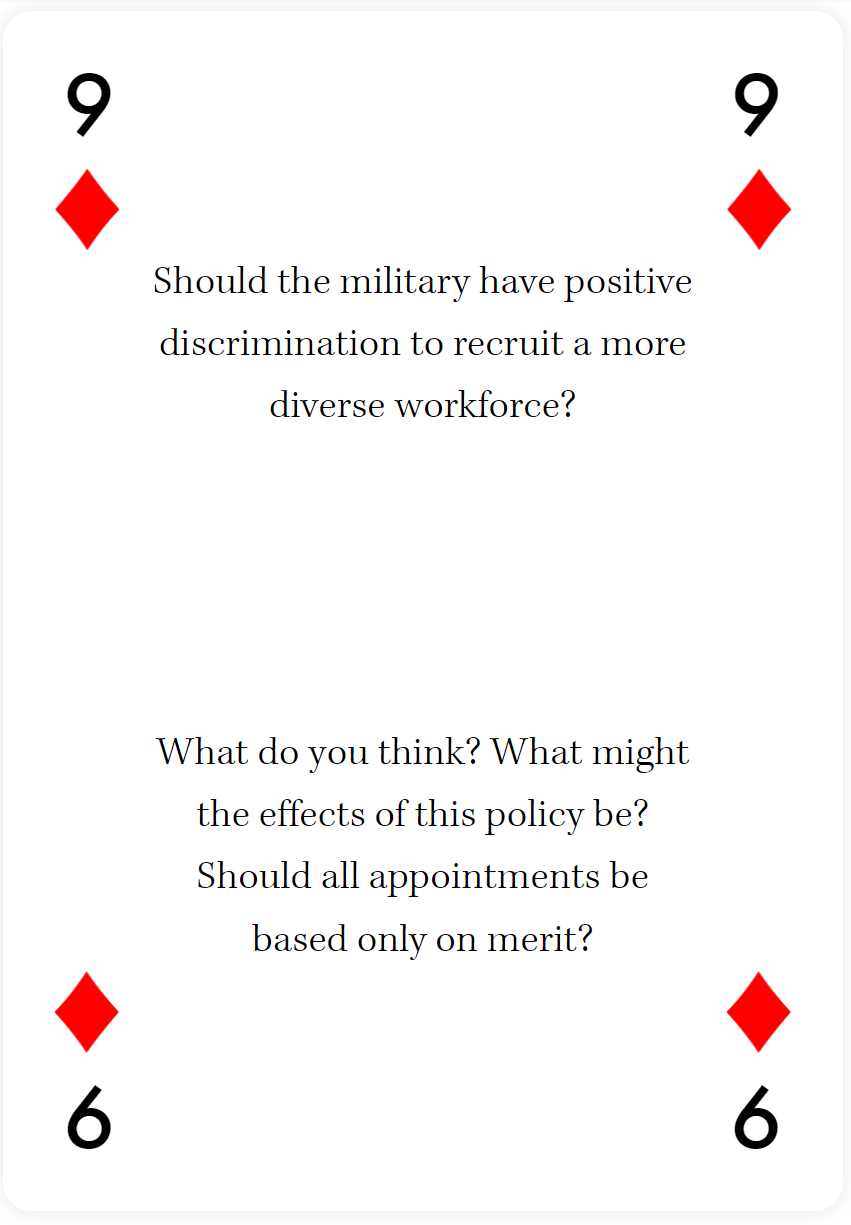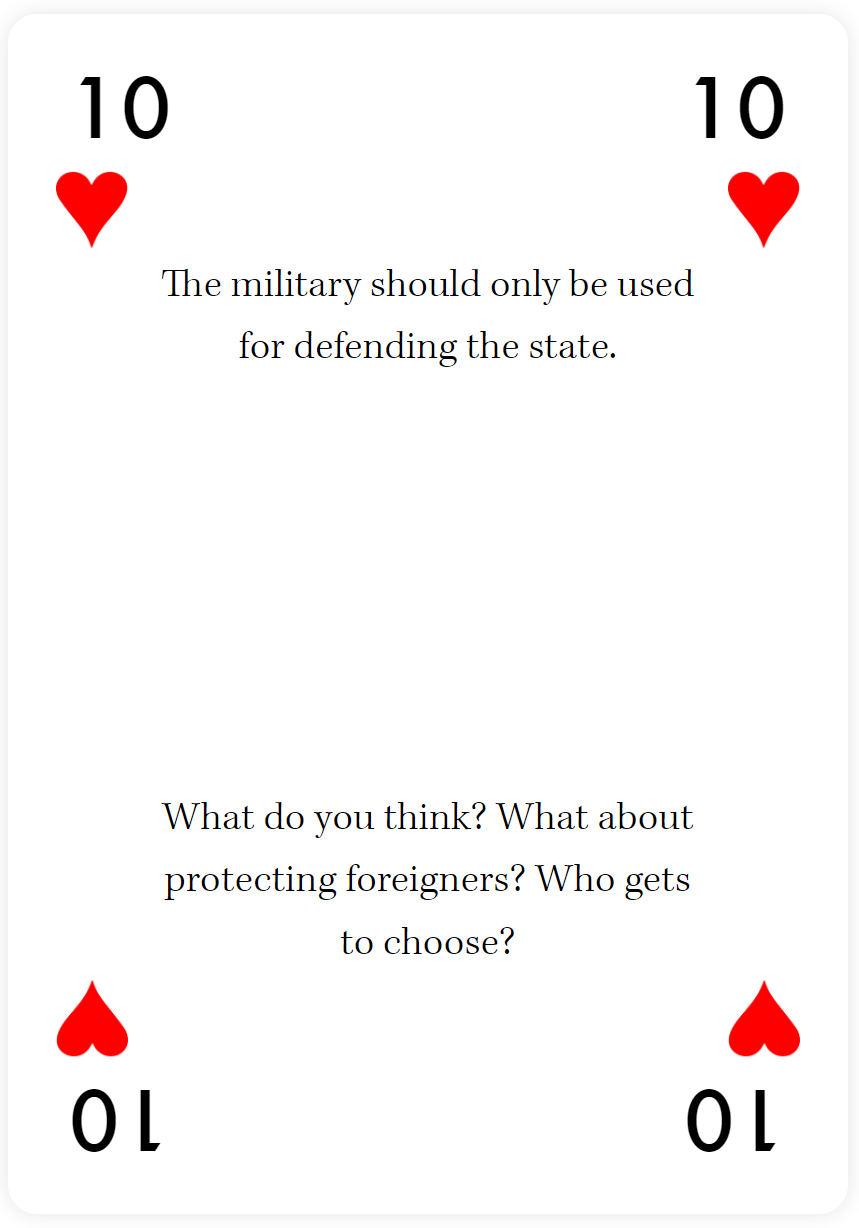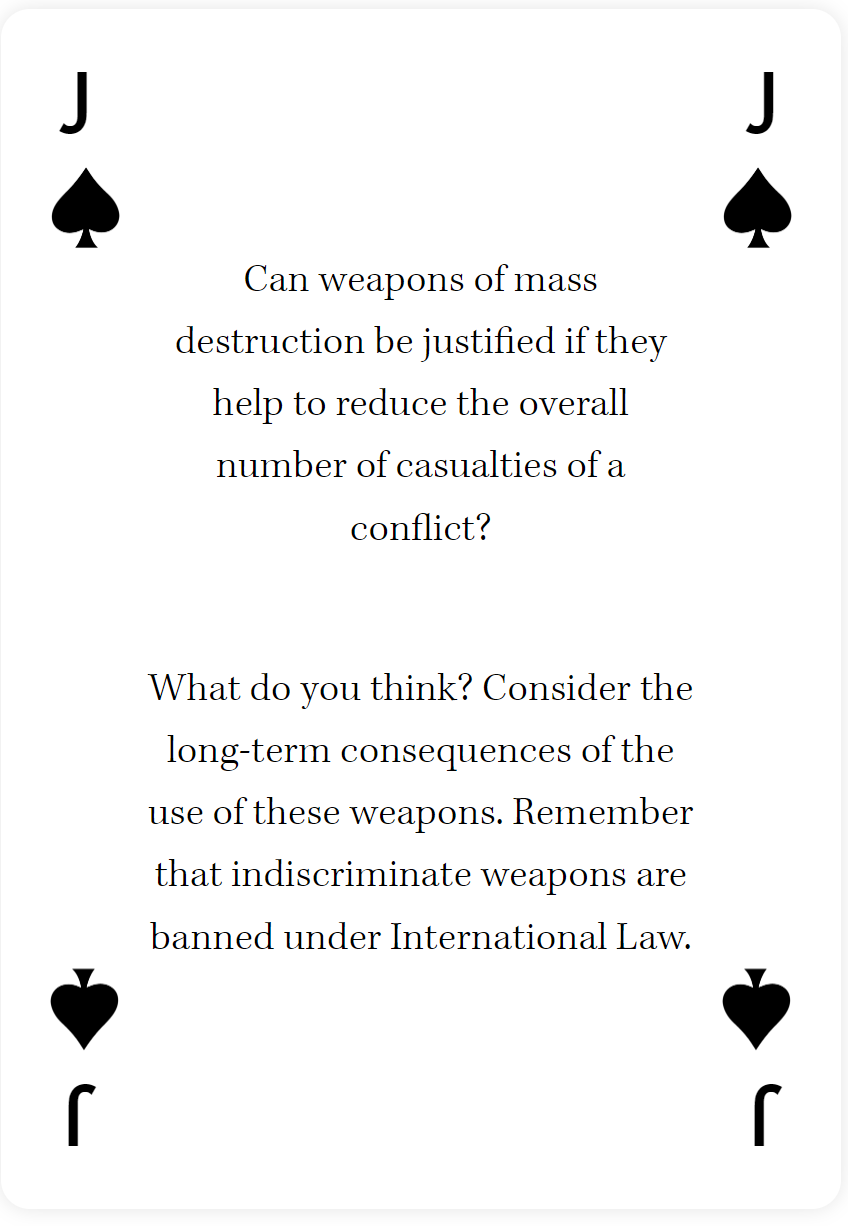Centre for Military Ethics Playing Cards: Military Deck. King’s College London Centre for Military Ethics, 2021.
Playing cards have an extensive association with the U.S. Armed Forces. Purpose-built decks of cards made to alleviate boredom in the U.S. Civil and Spanish-American wars gave way to more ingenious applications in the Second World War and Vietnam.[1] More recently, playing cards have been used as shorthand for the most-wanted members of Saddam Hussein’s regime and to educate troops about cultural preservation.[2] The King’s College London Centre for Military Ethics (KCME) Military Ethics Education Playing Cards Deck, hereafter referenced as “the Deck,” is the latest worthy entry in that genre. The Deck as designed works very well for individual and small group reflections; this article will also propose three adaptations for using the deck in larger groups.
Soldiers Playing Cards (Joe Schwartz/Getty)
Playing the Hand You’re Dealt
The Deck can be played using one of three modalities: a standard-sized set of physical playing cards, a browser-based website, or via an app available on the Apple App Store and Google Play Store. The physical playing cards are easy to obtain for a small fee and look and feel just like standard playing cards. In fact, if players desire they can replace their standard preferred set of cards with this deck to have them readily available. The decks are available in many languages, including Spanish, French, Serbian, Turkish, Arabic, and British and American English. KCME also offers a companion Military Medical Ethics Deck; this review focuses exclusively on the Military Ethics Deck, but all of the same features are available for the Medical Ethics Deck as well.
The core of the Deck is deceptively simple: a standard playing card with an ethical question or statement. Looking more closely, however, the player quickly understands that this game is not about parroting back the right response. Instead, the prompts have no single right answer, which stimulates further thought and reflection. One or two additional prompts at the bottom of the card push players to broaden their thinking and incorporate other perspectives. Some cards showcase a tactical ethics dilemma, but the deck also includes a much broader range of professional challenges, such as:
“Should the military have positive discrimination to recruit a more diverse workforce?”
“The military should only be used for defending the state.” [Agree/Disagree]
“Can weapons of mass destruction be justified if they help to reduce the overall numbers of casualties in a conflict?”
The discussion and reflection can extend beyond the individual card. Each card has a unique link to additional information and reflective prompts. The website and the app provide the links embedded in the playing cards; the physical card deck has a QR code on the back of each playing card that links to the same text. The links also contain options for further reading, many of which are directly hyperlinked from the page. KCME also invites participants to share perspectives and stories that supplement the insights contained on the cards and additional material. Submitting those perspectives is not as well developed as the rest of the game. Currently, users must record themselves and then email them to KCME using a personal cloud-based service like GDrive, iCloud, or Dropbox. KCME has been steadily improving the web presence of the Deck, and a streamlined reflection submission process would be a welcome addition.
As currently created, the Deck works well for individual or small group reflections. In casual use, the Deck has great potential to spur off-the-cuff conversations about contentious topics while playing standard card games. The app and website are less likely to be used in a casual context simply because they stand apart from other card-playing apps on mobile phones. However, the ease of access to the KCME website and app make it easy for any service member to access the Deck digitally and use it for either individual study or small group activities. As it currently stands, there is no guidance from KCME for use of the deck in larger sessions of military ethics education involving dozens or even hundreds of people, either in professional military education or at the unit level. The next section of this article proposes three scalable approaches for using the Deck in large group instruction.
Three Group Exercises for the Deck
All of the below exercises are designed around using the physical Deck in large groups, but the web- or app-based Decks could also be used. A unit or institution can easily purchase one or two decks and retain them in their library for these events. The meeting space itself can be the same space typically used for comparable unit/institutional activities:
Ethics Physical Training (PT): This activity is based on the idea of PT Poker, where participants turn over a card and perform the number and type of exercises based on the card. In Ethics PT, the numbers on the card don’t matter, only the suit. Any open area normally used for PT can be used for Ethics PT. Designate each suit as one exercise (e.g., Hearts = High Jumper, Spades = Windmill). The exercises should allow participants to speak while performing them—U.S. Army Physical Readiness Training Preparation Drills work well for this. A standard Deck can be divided up among as many small groups as needed; the groups themselves should not exceed five or six people. The group leader turns over the card, reads the text, and then announces the exercise to be done along with it. All members of the group perform the exercise at their own cadence while each member of the group provides an answer to the text. Once all members have responded, the group leader turns over another card and the cycle begins anew. The exercise continues until complete, either based on time elapsed or a set number of cards turned over.
Ethics Speed Debating: This approach derives from the concept of speed dating as a way to engage multiple participants on an individual basis. Chairs are placed in two rows, facing one another, ideally with a flat surface in between them. There should be enough chairs for all participants. Place a single card from the Deck face up between each pair of chairs. The moderator runs a timer of two-three minutes for each round. In a round, the two participants in a pair must choose opposite sides of the question/challenge posed. For instance, given the prompt “If you break the rules, you should be punished even if the issue doesn’t seem very important,” one participant must choose Agree and one must choose Disagree. Participants debate each other from their position until the round timer runs out. Each participant then moves to their right, so they are now paired with a new participant at a different pair. The exercise continues until all participants have been paired with one another. Moderators may add a group reflection at the end if desired.
Ethics World Café: This variant uses the World Café conversation technique, which is widely used to support diverse discussions, to combine the support of a small group with the ability to hear multiple perspectives over time.[3] The World Café requires a single space large enough to hold the entire group that also contains sufficient tables and chairs to break the group down into smaller teams of 4-5 people. The Deck is broken up among the tables and participants likewise sit in any available seat. The moderator should ensure that participants are roughly evenly distributed. The moderator sets a timer, the top card on each table’s deck is turned over, and participants discuss the card. The participants can use the QR code on the back of the cards for additional prompts and discussion as needed. When time runs out, all participants switch tables. No participant can sit with any of the same people they previously sat with. The moderator runs 3-4 sessions in this manner, and then brings the entire group together to share insights and feedback.
Final Thoughts
The Deck does raise a larger question about ethics education: to what extent should military ethics education encourage novel or innovative thinking from individuals versus inculcating larger organizational norms?[4] There is no easy answer to this question. As Pauline Shanks Kaurin puts it, “Obedience is not simply an individual virtue, choice, or action but also has a collective aspect that must be considered.”[5] Educational proponents must assess their students’ level of socialization into the profession as well as their existing knowledge. Free play in ethics education is probably not warranted for a group of initial entry trainees, but is desperately needed for seasoned professionals. The Deck gives an institution both options, with the free play aspects of the cards supplemented by the online organizational resources.
“La Partie de Cartes, 1917 (Soldiers Playing Cards)” by Fernand Léger (Kröller-Müller Museum)
The KCME Military Ethics Education Playing Cards Deck is an exceptionally versatile tool that has great utility for both individual reflection and organizational-level ethics education. It should become part of professional military ethics education toolkits across the U.S. Armed Forces and its allies and partners. As more military practitioners use the Deck, they should contribute their own stories and perspectives to KCME to make the tool even better.
Ray Kimball is the Founder and Chief Executive Officer of 42 Educational Games Coaching and Design. He is a retired U.S. Army officer with extensive experience in professional development and game-based learning. This review essay reflects his own views and not necessarily those of the U.S. government or the Department of Defense. Except as noted, all images in the article are taken by the author and used with the consent of KCME.
The Strategy Bridge is read, respected, and referenced across the worldwide national security community—in conversation, education, and professional and academic discourse.
Thank you for being a part of the The Strategy Bridge community. Together, we can #BuildTheBridge.
Header Image: “Soldiers Playing Cards and Dice” by Valentin de Boulogne (National Gallery of Art)
Notes:
[1] For instance, some WWII decks were specifically designed to peel apart, revealing escape and evasion maps concealed with. In Vietnam, the Bicycle Company printed decks consisting entirely of the Ace of Spades for use against the Viet Cong, who were supposedly superstitious about the symbol. “The Cards of War”, Bicycle Brand Playing Cards, accessed February 15th, 2022, https://bicyclecards.com/article/the-cards-of-war/; “A Map Inside the Cards”, Bicycle Brand Playing Cards, accessed February 15th, 2022, https://bicyclecards.com/article/a-map-inside-the-cards/
[2] Elise Craig, “These Playing Cards School U.S. Soldiers in Archaeology”, Wired.com: Security, December 12, 2013, https://www.wired.com/2013/12/monumentswoman/
[3] For more on the World Café Approach, see “A Quick Reference Guide for Hosting World Café”, The World Café Community Foundation, 2015, http://www.theworldcafe.com/wp-content/uploads/2015/07/Cafe-To-Go-Revised.pdf
[4] My sincere thanks to Amanda “Mandi” Rollinson, USMA Department of History, for raising this issue during a read-through of this article.
[5] Pauline Shanks Kaurin, On Obedience: Contrasting Philosophies for the Military, Citizenry, and Community, Annapolis, MD: Naval Institute Press, 2020, 20.






